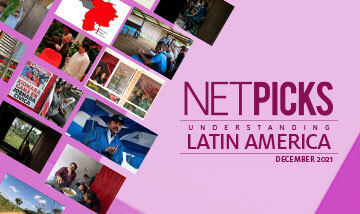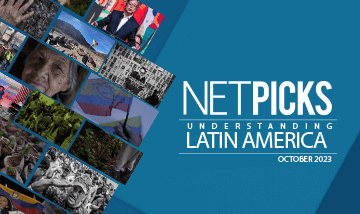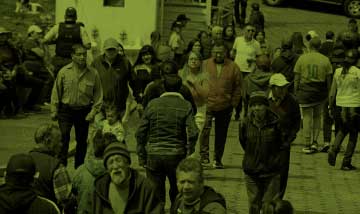Índice
- Understanding Latin America
- TOWARD AN ASSESSMENT OF VENEZUELA’S REGIONAL ELECTIONS
- ARGENTINA’S FAR RIGHT AND FAR LEFT MAKE BIG GAINS IN CONGRESSIONAL ELECTIONS
- NICARAGUA: ORTEGA’S SYNTHESIS
- COLOMBIA IS PITTING TWO VULNERABLE GROUPS AGAINST EACH OTHER. AT STAKE IS THE AMAZON
- HONDURAS. XIOMARA CASTRO’S HISTORIC WIN: WHAT HAPPENS NEXT?
- .TWO PUBLICATIONS OF THE ROSA LUXEMBURG FOUNDATION
- THE ATLAS OF ENSLAVEMENT. WE CAN END MODERN SLAVERY AND PREVENT IT IN THE FUTURE
- .CLIMATE JUSTICE FROM THE PERSPECTIVE OF LATIN AMERICAN AND OTHER SOUTHERN FEMINISMS
Understanding Latin America
Dear readers and colleagues, this month we bring you five articles that reflect the reality of Latin America: one each from Venezuela, Argentina, Nicaragua, Colombia and Honduras, plus two publications of the Rosa Luxemburg Foundation.
This is our last newsletter of the year. After a short break, we will resume our monthly newsletter in February 2022. We wish you enjoy the holidays and have a great new year!
- Toward an assessment of Venezuela’s regional elections
- Argentina’s far right and far left make big gains in congressional elections
- Nicaragua: Ortega’s synthesis
- Colombia is pitting two vulnerable groups against each other. At stake is the Amazon
- Honduras. Xiomara Castro’s historic win: what happens next?
- The atlas of enslavement. We can end modern slavery and prevent it in the future
- Climate justice from the perspective of Latin American and other southern feminisms
.
TOWARD AN ASSESSMENT OF VENEZUELA’S REGIONAL ELECTIONS
The regional and municipal elections held in Venezuela on November 21st led to victory for the governing Chavista party, PSUV, which won 18 of 23 states and 205 municipalities, with the various opposition forces managing three governorships and 117 municipalities. At the time of writing two governorships remained in dispute and the results in a dozen municipalities were yet to be finalized. The more general picture, says the author, is that these elections demonstrate a changing political context, in which both sides have been obliged to face reality. The government, on the one hand, employing a more positive tone in its campaign style, is in economic difficulties, globally isolated and hostage to its own macroeconomic mistakes, and as a result has, amongst other things, opened up the economy and negotiated with business leaders. On the other hand, the return of the Democratic Unity Roundtable (MUD) to the ballot box was a clear sign of its awareness that shortcuts to changing the balance of power do not exist: elections are now the only game in town. One positive element of the vote, says the author, was the presence of a large number of “third forces” that achieved positive results with narratives of reducing polarization and rejecting both the government and the traditional opposition. The more than 50% abstention is a real issue, reflecting the idea of two Venezuelas, both of which have lost interest in politics: one that has managed to resolve its own problems, the other, abandoned, without electricity for eight hours a day, and where no government programs or opposition leaders are visible except at election time. Here, says the author, the principal interest is survival and the principal feeling a lack of interest in grandiose plans, unattainable proposals, and boring speeches.
Damian Alifa, November 26th, 2021.
https://nacla.org/news/2021/11/26/venezuela-regional-elections
.
ARGENTINA’S FAR RIGHT AND FAR LEFT MAKE BIG GAINS IN CONGRESSIONAL ELECTIONS
The recent mid–term congressional elections in Argentina saw the Peronist Front for Everyone of President Alberto Fernández (and Vice President Cristina Fernández-Kirchener) lose its majority in the national Congress for the first time in almost 40 years. The coalition also lost its grip on Buenos Aires province, where the winner was the center-right Together for Change coalition of ex-President Mauricio Macri, who hopes to return to power in the 2023 Presidential elections. In Argentina’s main electoral district, the province of Buenos Aires (with 15 million of Argentina’s 45 million inhabitants) the Fernández’ and Macri coalitions both obtained 15 seats in the lower house of Congress while a far-right party won three seats and the leftwing FIT two. The surprise was not Fernández’ poor performance, but the strong showing on the national level of the Trotskyist FIT (Frente de Izquierda y de Trabajadores) which is now the country’s third political force, winning 6% of the national vote, and the far right supposedly libertarian Avanza Libertad. The party’s leader, Javier Milei, known for boasting about his sexual prowess, won 17% of the vote in the Capital Buenos Aires, while another of the party’s candidates, lawyer Victoria Villaroel, who campaigns for the release of the jailed torturers and murderers of Argentina’s 1976-83 dictatorship, won a congressional seat for the Buenos Aires district. Argentina’s political system is braced for an earthquake, says the author.
Uki Goñi, November 15th, 2021.
https://www.theguardian.com/world/2021/nov/15/argentina-congressional-elections-far-right-far-left-make-big-gains
.
NICARAGUA: ORTEGA’S SYNTHESIS
Nicaraguans went to the polls on November the 7th, in the first vote since the major demonstrations that challenged President Daniel Ortega’s Sandinista government in 2018. And while Ortega was standing for a fourth consecutive term, there was no viable opposition. Almost every anticipated anti-Sandinista candidate had been jailed, and the only permitted candidates were from marginal government-aligned parties. Unsurprisingly, Ortega and his wife and vice presidential candidate, Rosario Murillo, won 75% of the vote. Ortega and his Sandinista Front have now been in power since 2007, when he took power after a sustained period of neoliberalism had left 70% of the national labor force with no fixed employment. The impact was substantial. In 2005, the year before the election, 48.2% of Nicaraguans subsisted on less than two US dollars per day; by 2017, that number had fallen to 20.1%. Unlike other pink tide leaders, however, Ortega did not promise socialism, but in a similar style to Lula, made peace with business sectors and promoted himself as the only person capable of stabilizing the country. Little by little that relation has broken down, and during the 2018 uprising the major business association distanced itself from the government and, among other things, its tactics of employing paramilitaries against the opposition. In this context, and with a seriously debilitated economy, the implications of Ortega’s latest victory are not entirely clear. Still celebrated by leftists in many parts of the Global North for his opposition to US hegemony, the realities on the ground mean a balanced evaluation of the regime, its contradictions and actions, is overdue. And if the country soon takes a rightward turn, says the author, “its roots will lie in the Sandinistas’ untenable program, which ties the fortunes of workers to the profits of their exploiters”, concluding that “Ortega has been re-elected, but he may not be president for long.”
Jonah Walters, November 12th, 2021.
https://newleftreview.org/sidecar/posts/ortegas-synthesis
COLOMBIA IS PITTING TWO VULNERABLE GROUPS AGAINST EACH OTHER. AT STAKE IS THE AMAZON
Five years after the signing of Colombia’s historic peace accords, land continues to drive conflict in the country. The failure of the state to define who owns what land or to record the limits of protected areas, has led farmers displaced by the country’s internal conflict to buy property in Indigenous reserves abandoned because of the violence. The difficulty is that the owners now want to return, provoking conflict over land between two marginalized and brutalized communities. Colombia has one of the most unequal distributions of land in the world, the top 1 percent of landowners owning nearly 43 percent of rural land, while small-hold farmers, who produce half of the food consumed in the country, own just 4.8 percent of productive land: about half of rural lots also lack a title. The problem of unequal land distribution was one of the reasons the FARC took up arms in the 1960s, but the conflict did not improve the situation: with more than 16 million acres stolen, millions of families forced off their land, and one of the largest internally displaced populations in the world. President Ivan Duque says the government is working to resolve the problem of land registration but the figures don’t bear him out: as of August of this year only 15 percent of national territory had been included in the national registry. The peace deal also called for the creation of a special agrarian jurisdiction to resolve land conflicts, but congress has not approved the law to establish it. Meanwhile, violence has continued to grow. From January to July, internal displacement increased by 167 percent over the same period a year earlier, and more than 400,000 people have been displaced since the accords were signed. According to Indigenous leader Yerley Bocanegra the state has completely abandoned the farmers and Indigenous people. “It’s a war without end,” he said.
Samantha Schmidt and Diana Durán, November 21st, 2021.
https://www.washingtonpost.com/world/2021/11/21/colombia-peace-accords-land-titles/
HONDURAS. XIOMARA CASTRO’S HISTORIC WIN: WHAT HAPPENS NEXT?
The recent Honduran presidential elections brought the 12-year reign of Juan Orlando Hernández’ National party to a close. Over fifty percent of the votes went to his leftist opponent Xiomara Castro, in part due to the drug trafficking accusations leveled at Hernández and senior members of his party. Hernández younger brother is also serving a life term in the US for drug related offences. The question now is what Castro, wife of former president Zelaya who was ousted by a coup in 2009, can do to turn things around and lift Honduras out of a plight that has seen millions of its citizens seek a better life elsewhere. There are important obstacles to overcome. One is the fate of Hernandez, who if not convicted, could make her Castro’s life difficult; another is that the outgoing government could pass legislation to hinder reform; a third is her ties to Zelaya, where any suggestion of him governing from behind the throne could seriously affect her popularity; a fourth, is the fragility of the coalition with sometime-ally-sometime-opponent Salvador Nasralla, who was essential in ensuring her victory; and a fifth, a possibly divisive call for a Constitutional Assembly. On the other hand, says the author, despite the difficulties “a new era is set to begin with Castro at the helm, a president who will have a rare opportunity to set the country on the right track.”
Patricio Navia and Lucas Perelló, November 30th, 2021.
https://www.americasquarterly.org/article/xiomara-castros-historic-win-what-happens-next/
.
TWO PUBLICATIONS OF THE ROSA LUXEMBURG FOUNDATION
THE ATLAS OF ENSLAVEMENT. WE CAN END MODERN SLAVERY AND PREVENT IT IN THE FUTURE
It would be wrong to assume that slavery no longer exists today. Indeed, according to the latest estimates by the International Labor Organization, at least 40 million people worldwide are affected by “modern slavery”. This term includes forced labor as well as forced prostitution and other forms of exploitation. Modern slavery is woven into our clothing and is prevalent in the global sex industry and in domestic service. It is particularly important to present these connections now, during the COVID-19 pandemic, because victims of enslavement are currently under particular pressure from the threat of deportation. In addition, the economic recession that accompanies the pandemic is likely to put even more people at risk of trafficking and slavery. The Atlas of Enslavement is a publication that aims to move the issue of modern slavery higher up the international political agenda. It was released on the occasion of the International Day for the Abolition of Slavery and provides an in-depth analysis of the inhumane “enslavement market” in 25 articles and more than 50 graphics for a better understanding of the gravity of the situation. It is available in English, French and German.
Geneva Office – Rosa Luxemburg Foundation, November 30th, 2021.
https://atlasofenslavement.rosalux-geneva.org/
.
CLIMATE JUSTICE FROM THE PERSPECTIVE OF LATIN AMERICAN AND OTHER SOUTHERN FEMINISMS
The most recent report of the Intergovernmental Panel on Climate Change (IPCC) corroborated what had already been stated in its previous publications, but with more precise and more robust data: that the process of global warming is affecting both land and ocean, and that the scale of the recent changes is unprecedented in the history of the planet (IPCC 2021). In recent years it has also been recognized that the impacts of climate change on human populations are determined, or strongly influenced, by pre-existing social inequities that produce “more vulnerable populations, with differentiated risks created by social, economic, cultural, ethnic and gender marginalization” (Arana Zegarra 2017: 1, see also IPCC 2001). In this sense, gender-differentiated impacts of climate change are now recognized, as are the gender-differentiated contributions to climate change, that is, the differentiated contribution of women and men to greenhouse gas (GHG) emissions (CIM 2008, Stock 2012). The feminist critical approach presented in this document is a result of questioning a climate change management that overlooks the systemic and civilizational crisis caused by the modern colonial patriarchal capitalist system, of which climate change is a symptom. Its critical approach also brings together the knowledge and conceptualizations of the feminist praxis of Latin American and other southern regions, in the hope these will nurture debate about integrating a gender approach into climate change action.
Melissa Moreano Venegas, Miriam Lang, Gabriela Ruales Jurado, November 2021.
https://rosalux.org.ec/en/climate-justice-from-the-perspective-of-feminisms/





